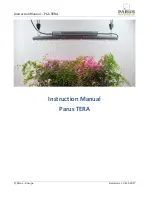
www.balluff.com
BIS U-602_ Processor Unit
TCP/IP / RS232
29
The controlling system and processor unit communicate with one another via telegrams. Specific
telegrams exist for individual tasks and always begin with the command associated with the
telegram type.
'CS'
Synchronous detection
'CA'
Asynchronous detection
'R'
Reading
'W'
Writing
'QH'
Reset
'QS'
Stop
'QP'
Standby (power save)
'IR'
Import control inputs
'OS'
Switch control outputs
Note
Continual polling on the port is not permitted. The waiting time between two com-
mands must be a minimum of 20 ms.
Start address and
number of bytes
The start address (A5, A4, A3, A2, A1, A0) and the number of bytes to send
(L5, L4, L3, L2, L1, L0) for the USER data are transmitted as ASCII cha-
racters in decimal format. A range of 0 to 999999 can be used for the start
address and 1 to 1024 for the number of bytes.
A0 through L5 each represent one ASCII character.
Note
The start a number of bytes must not exceed the data carrier
capacity.
Field lengths
The user data start address and length, TID length and EPC length parame-
ters affect the format of the telegrams.
Acknowledgment The acknowledgment <ACK> is sent by the identification system if the serial
transmitted characters were recognized as correct and there is a data carrier
located within the working range of the antennas.
<NAK> + 'Status No.' is used to acknowledge a detected error.
Bytes sent
The data is sent code-transparent (no data conversion).
Identification via
EPC
The EPC memory in the data carriers must be addressed with 'E' according
to EPCglobal
TM
tag data standards. All other data carriers with 'e' acc. to
ISO
/
IEC 15691.
8.4 Communication
Telegram types
with associated
command (ASCII
characters)
Explanations of
telegram content
8
Device Function
Summary of Contents for BIS U-6020-053-10 RS232
Page 2: ...www balluff com...
















































